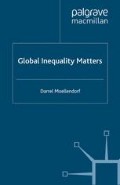Abstract
In the previous chapter, I argued that coercion accounts fail to provide compelling reasons to believe that duties of distributive justice to non-compatriots are either less weighty or less demanding in content than duties to compatriots. Now, some philosophers who affirm that duties of justice are owed to persons across state borders base their view on an account of justice that takes its requirements to be largely uniform between persons and not affected by their membership in political or economic associations. Others maintain, on the contrary, that membership affects the requirements. Call this thesis membership dependence. Membership dependence holds that the requirements of justice between persons are affected by associational membership either because the content of the duties is in some part membership dependent, or because the strength of the duties is. Membership dependence is affirmed by some egalitarian liberals as a pivotal thesis in an argument in defense of the claim that duties of distributive justice to non-compatriots are not egalitarian, even though duties to compatriots are. Call this non-compatriot non-egalitarianism. Coercion accounts are versions of non-compatriot non-egalitarianism. One strategy for rejecting non-compatriot non-egalitarianism is to reject membership dependence.
Access this chapter
Tax calculation will be finalised at checkout
Purchases are for personal use only
Preview
Unable to display preview. Download preview PDF.
Notes
Thomas Nagel, ‘The Problem of Global Justice,’ Philosophy and Public Affairs 33 (2005): 119.
Kok-Chor Tan, ‘The Boundary of Justice and the Justice of Boundaries,’ The Canadian Journal of Law & Jurisprudence XIX, no. 2 (July 2006): 341.
Simon Caney, Justice Beyond Borders (Oxford: Oxford University Press, 2005), 37.
Peter Singer, One World: The Ethics of Globalization (New Haven: Yale University Press, 2002)
John Rawls, Theory of Justice, rev. ed. (Cambridge, Mass.: Harvard University Press, 1999), 302.
Robert Nozick, Anarchy, State, and Utopia (New York: Basic Books, 1975), 185.
See the thorough discussion of such strategies in Ha-Joon Chang, Kicking Away the Ladder: Development Strategy in Historical Perspective (London: Pnthem Press, 2002).
Cf. Guy Standing, Global Labour Flexibility: Seeking Distributive Justice (New York: St. Martin’s Press, 1999)
See Giovanni Andrea Corina, ‘Globalization and the Distribution of Income Between and Within Countries,’ in Ha-Joon Chang, ed., Rethinking Development Economics (London: Anthem Press, 2003), 423–450.
Robert Keohane and Joseph Nye Jr., ‘Governance in a Globalizing World’ in Robert Keohane ed., Power and Governance in a Partially Globalized World (New York and London: Routledge, 2002), 199–200.
Bernard M. Hoekman and Michel M. Kostecki, The Political Economy of The World Trading System (Oxford: Oxford University Press, 1995), 154.
Derek Parfit argues that intergenerational justice is such a condition, but I am not convinced. See Derek Parfit, Reasons and Persons (Oxford: Oxford University Press, 1984), 391–393
Cf. John Rawls, Justice as Fairness, Erin Kelly ed., (Cambridge, MA: Harvard University Press, 2001), 149.
Cf. Henry Shue, Basic Rights (Princeton: Princeton University Press, 1996).
This certainly is not a novel claim. See Norman Daniels, ‘Equal Liberty and the Unequal Worth of Liberty,’ in Norman Daniels, ed., Reading Rawls: Critical Studies on Rawls’ A Theory of Justice (Stanford: Stanford University Press, 1989), 253–281.
Michael Walzer, Spheres of Justice (New York: Basic Books, 1983), 19.
Ronald Dworkin, Law’s Empire (Cambridge, MA: Harvard University Press, 1986), 52–53.
David Miller, ‘Two Ways to Think About Justice,’ Philosophy, Politics, and Economics 1 (2002): 7.
Elizabeth Anderson, ‘What is the Point of Equality?’ Ethics 90 (1999): 322.
A.J. Julius, ‘Nagel’s Atlas,’ Philosophy and Public Affairs 34 (2006): 191.
Joshua Cohen and Charles Sable, ‘Extra Rublicam Nulla Justitia?’ Philosophy and Public Affairs 34 (2006): 173.
Branko Milanovic, ‘True World Income Distribution, 1998 and 1993: First Calculataions Based on Household Surveys Alone,’ Economic Journal 112 (2002): 51–92.
Author information
Authors and Affiliations
Copyright information
© 2009 Darrel Moellendorf
About this chapter
Cite this chapter
Moellendorf, D. (2009). Equal Respect in Political and Economic Associations. In: Global Inequality Matters. Global Ethics Series. Palgrave Macmillan, London. https://doi.org/10.1057/9780230246904_3
Download citation
DOI: https://doi.org/10.1057/9780230246904_3
Publisher Name: Palgrave Macmillan, London
Print ISBN: 978-1-349-30953-5
Online ISBN: 978-0-230-24690-4
eBook Packages: Palgrave Political & Intern. Studies CollectionPolitical Science and International Studies (R0)

